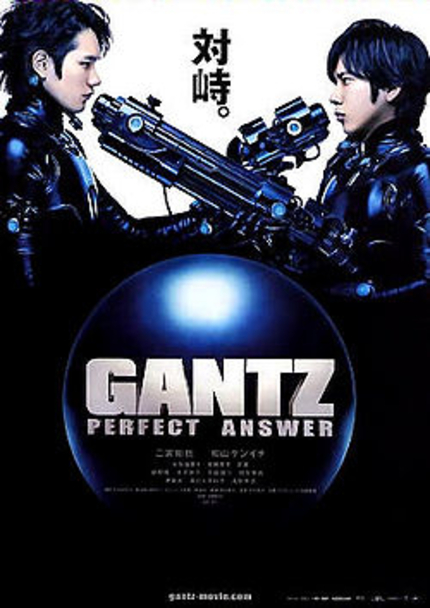GANTZ: PERFECT ANSWER Review

Hot on the heels of the first
film, GANTZ: PERFECT ANSWER arrives within three months of its predecessor,
boasting the same cast of young attractive stars and the same flashy production
values, while also clocking it at a hefty 150 minutes, crammed to the gills
with exposition and superfluous characters, rather than an engaging narrative
or exciting action.
After struggling my way through the first film, which spent two and a half hours on set-up and introductions, only to end just when things were starting to get interesting, I was wary of this sequel. At the same time, however, I had come so far and being unfamiliar with the source material, just had to find out where the story was going. In response to my wariness, GPA (for brevity's sake) opens with a brisk, succinct 90-second recap of everything that happened in the first film. Why the filmmakers couldn't have covered the same ground in, say, the first hour of GANTZ and spared us a second film we can but wonder, but for those in need, this is what happened - spoilers ahead for the first film:
University student Kurono (Ninomaya Kazunari) is reunited with childhood buddy Kato (Matsuyama Kenichi) on a subway platform, only to both be hit by a train trying to help some poor sap who fell on the tracks. They are transported to an apartment where a large black sphere named Gantz enlists them and others to play a series of games, killing aliens. If they die in the game, they die for real, but if they survive they score points. 100 points allows them either to return home with an erased memory or save a fallen comrade. When a large, 1000-armed extra-terrestrial kills Kato, Kurano vows to earn enough points to bring his friend back...
And so to GPA...
Five months have passed and Kurono is well on his way to 100 points. Between missions, GANTZ allows him to assume his normal life, where Tae (Yoshitaka Yuriko) is desperate to start a relationship but understands Kato's "disappearance" has him pre-occupied. Meanwhile, a small black orb appears and assigns murderous missions to a former popstar, while a detective (Yamada Takayuki) investigates numerous sightings of recently deceased members of the public, including Kato. However, when a teammate hits 100 points and opts to resurrect Kato, they realize an alien imposter has adopted Kato's form and is also hunting for the black orb.
For the first hour or so GPA totally engages its audience, introducing intriguing new characters such as Eriko the femme fatale, and a mysterious gang of gun-toting aliens. The script also expands the plot in interesting directions that culminate in the film's strongest set piece - an extended showdown on a packed commuter train between the Gantz players armed with their sonic pistols, the suited alien gang brandishing katana swords that morph from their hands, Eriko's lone killer and Yamada's nameless detective, all gunning for the same target: poor, unsuspecting Tae. It's an excellent sequence that not only features some entertaining action as rival players clash and innocent bystanders are gunned down in scores, but it also ties all the different story threads together with surprising efficiency.
However, this marks the high point of GPA and it never gets as good as this again, in the 90 minutes that follow. There is an impressively-staged fight towards the end, where Kato and Kurono both engage in a street brawl with Alien Kato, that requires Matsuyama Kenichi to fight both himself and Ninomaya simultaneously for a solid five minutes, but elsewhere the CGI varies wildly in quality, and is at its worst when depicting characters leaping Spider-Man-like from rooftop to rooftop. The plot steadily unravels in the second half, culminating in a finale that is mostly contradictory when not totally nonsensical and leads to a lengthy epilogue that is nauseatingly sentimental and terribly written. Director Sato Shinsuke may have a passable grasp of visual aesthetics, but both GANTZ films show up his startling inability to employ subtlety, nuance or suggestion in his work. Where a nod, gesture or telling wink would have ably sufficed, Sato repeatedly insists on spoon-feeding his audience needless exposition.
Noted, these films are based on an equally long-winded series of comic books, but staying faithful to the source material at the expense of delivering an entertaining final product is counter-productive - and I have been reliably informed that in other areas of the script, the writers have significantly changed the story to suit their needs, thus rendering this defense redundant.
Most criminal of all is that a film with such an excessive running time all but completely wastes the talents of its cast, most notably Yamada Takayuki, whose detective has criminally little to do, other than occasionally emerge from the shadows and point a gun at someone. Admittedly his character in the comics is even more insignificant, but if the writers are going to beef up the part and cast a notable actor like Yamada, they should at least get their money's worth and have him do something. It's a potentially interesting character and his perspective is perhaps closest to that of the audience, but he is all-but ignored from the moment he is introduced. He isn't even given a name.
While there are no immediate
plans for a third instalment, GANTZ: PERFECT ANSWER is left conveniently
open-ended, refusing to explain numerous gaping plot holes, while breaking its
own rules to resurrect key characters ahead of further adventures. We can but
pray for more ruthless scripting next time out, however, because of the five
hours now committed to film, GANTZ delivers precious little action and far too much meaningless talk about balls.
Gantz: Perfect Answer
Director(s)
- Shinsuke Sato
Writer(s)
- Hiroya Oku (manga)
- Yûsuke Watanabe (screenplay)
Cast
- Kazunari Ninomiya
- Ken'ichi Matsuyama
- Yuriko Yoshitaka
- Ayumi Itô







